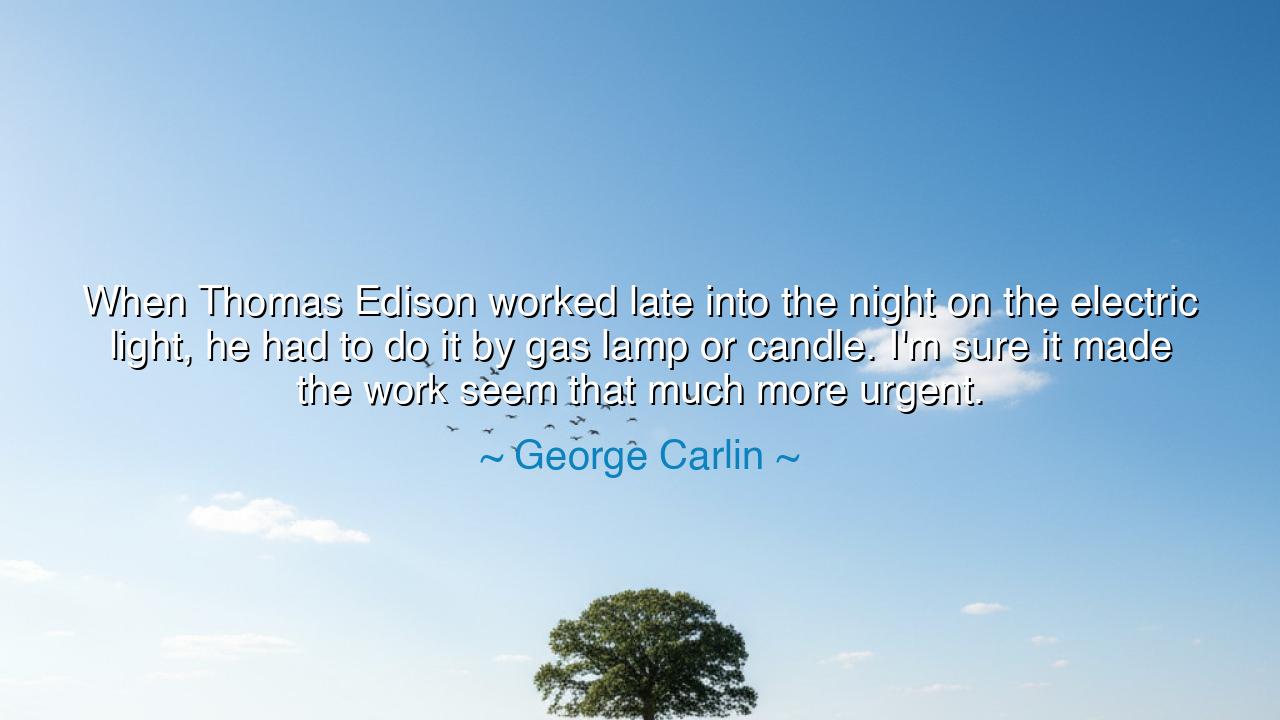
When Thomas Edison worked late into the night on the electric
When Thomas Edison worked late into the night on the electric light, he had to do it by gas lamp or candle. I'm sure it made the work seem that much more urgent.






Hear the sharp yet insightful words of George Carlin, who, though often a jester of his age, speaks here with timeless wisdom: “When Thomas Edison worked late into the night on the electric light, he had to do it by gas lamp or candle. I’m sure it made the work seem that much more urgent.” These words reveal a paradox of human striving — that the very darkness against which we struggle often deepens our resolve to bring forth light.
Consider the image: Edison, a man laboring to banish the night, himself toiling by the dim glow of a candle or flickering gas lamp. Each moment of difficulty would have been a constant reminder of why his quest mattered. The shadows pressing in around him were not merely obstacles, but powerful symbols of the ignorance and limitation he sought to overcome. Thus, the struggle itself became fuel, making his work ever more urgent and his vision ever more clear.
Carlin’s reflection speaks to all who labor toward progress. Many great works are born out of frustration with the very conditions they aim to change. The healer is driven by the sight of sickness, the peacemaker by the sound of war, the inventor by the burdens of inefficiency. Just as the dim light spurred Edison, so too can hardship awaken in us a fierce determination to transform the world.
This story is also a lesson in perspective. From the outside, Edison’s invention may appear inevitable, a triumph foretold by history. But in the midst of the work, with darkness all around, success was uncertain and hope fragile. It was persistence — the choice to labor through the night despite the shadows — that ultimately brought the dawn.
Let future generations remember: great creations often arise not in comfort, but in struggle. When the world seems dim and progress slow, let that very darkness be your reminder of why you labor. For every candle and gas lamp is a symbol of what could be made brighter, and every moment of hardship brings you one step closer to the light you seek to bring forth.






KLHuynh Khanh Linh
George Carlin’s perspective on Edison’s struggle is a thought-provoking one. It’s easy to romanticize the past and think that the absence of modern comforts led to greater creativity, but is that really true? Could it be that the difficulties Edison faced made his work feel more meaningful? Or, do we just overlook the pressures and challenges that modern inventors face, assuming that today’s comforts come with an equal or greater level of intensity and focus?
TNVan Thieu Nguyen
This quote reminds me of how far we’ve come in terms of technology and the convenience we now take for granted. When I think of Edison working by candlelight, I wonder if we would still have the same drive if we were constantly faced with obstacles like that. Does modern technology make us less motivated? Could today’s inventors achieve greater things if they faced the same hardships as Edison did in his time?
AT30. 9/7 Anh Tho
It’s interesting how George Carlin highlights the struggle of innovation through something as simple as lighting. I’m curious: do we need challenges to feel motivated? Edison's need for gas lamps or candles added a layer of urgency to his work, but in today’s world, we might take technology for granted. Does ease and comfort make us less determined or focused on the problems we’re trying to solve, compared to earlier inventors who didn’t have the luxuries we enjoy?
THTra Hoang
This quote really makes me reflect on how the limitations of the past forced individuals to be more resourceful. Edison’s late-night work by gas lamp is an image that brings to mind the hardships of innovation. Is there something to be said about how adversity, even in small forms, can fuel creativity and invention? Do we, in the age of comfort and technology, miss out on the grit and urgency that can drive groundbreaking achievements?
TDTruong Tan Dung
I find this quote fascinating because it highlights the contrast between Edison’s time and the technology we have today. It almost suggests that the challenges and limitations of the past made people work with greater urgency and determination. Can we say the same for today’s innovators, with all our modern conveniences? Do we still feel the same sense of urgency to push boundaries, or has technology made progress feel more predictable and comfortable?